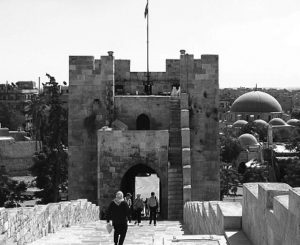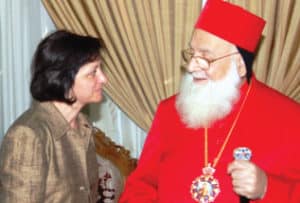Mirvet Kelly’s grandfather was a deacon. She narrates, “I remember going with him every Sunday to the Syro-Orthodox Divine Liturgy. I was proud to watch him all dressed up in white as he recited his portion of the prayers at the altar.”
There are several Christian Churches in Homs, Syria, where Mirvet grew up: Armenian Apostolic, Greek Orthodox and various Catholic Rites – Maronite, Melkite and Syro-Catholic. Before the war, even though they were linked to their own Churches, the faithful also attended other Churches without any problem.
 “As I grew up,” she went on, “a lot of things changed: Grandfather died and the Divine Liturgy seemed long and outdated. I was the only Christian at school among many Muslims. At Christmas and Easter, I’d be the only one absent and returning to school, I was bombarded with questions: ‘Why are there so many Churches? Why was your Jesus crucified and risen from the dead on different dates in different Churches?
“As I grew up,” she went on, “a lot of things changed: Grandfather died and the Divine Liturgy seemed long and outdated. I was the only Christian at school among many Muslims. At Christmas and Easter, I’d be the only one absent and returning to school, I was bombarded with questions: ‘Why are there so many Churches? Why was your Jesus crucified and risen from the dead on different dates in different Churches?
 Together with some friends, I decided to no longer belong to one Church or another, but to be Christians and that’s all. Like many of them, I stopped going to my own Church.” After a while, Mirvet met a group that was trying to live the Gospel according to the Focolare spirituality. “Through them, I discovered that God is the Father of everyone and that He loves us all as his sons and daughters. My life began to change. Every time I tried to love, going to visit an elderly person or a poor person, for example, my heart would overflow with peace and joy.
Together with some friends, I decided to no longer belong to one Church or another, but to be Christians and that’s all. Like many of them, I stopped going to my own Church.” After a while, Mirvet met a group that was trying to live the Gospel according to the Focolare spirituality. “Through them, I discovered that God is the Father of everyone and that He loves us all as his sons and daughters. My life began to change. Every time I tried to love, going to visit an elderly person or a poor person, for example, my heart would overflow with peace and joy.
One day, I came across a sentence in one of Chiara Lubich’s writings: ‘We should love the other person’s Church as our own.’Not only did I not love the other person’s Church – but I also didn’t love my own Church, which I had criticized and abandoned.
My life began to change. Every time I tried to love, going to visit an elderly person or a poor person, for example, my heart would overflow with peace and joy.
At that point, Mirvet’s life, which was already bearing fruit both personally and ecumenically, took a new leap. She felt God calling her to give herself entirely to Him.
“In the Focolare communities I’ve lived in,” she explained, “I found myself to be the only Orthodox among Catholics of all ages, countries, languages, and cultures. Some members came from different Churches and ways of thinking. Trying to live in unity with all the diverse ideas about things is always a challenge, because each of us has her own tastes and ideas down to the smallest details. But when we try to make ourselves one with the other person’s reality and try to live it as our own, we experience that these differences become an enrichment. We often pray for each other’s Churches, in an ongoing growth in the faith and in our relationship with God.
And almost without realizing it, we bring the fruit of our communion into our respective Churches, to our jobs and into our daily lives. It seems like a drop in the ocean, but even the tiniest steps united to those of many others in the world, can make a difference.In the countries of the Middle East where I have lived, for example, I saw priests helping people, without ever asking what Church they belonged to.
They organized projects to help out different Churches, to help them meet their needs, whether the persons were Christians – or even Muslims. Last year, Catholics and Orthodox faithful celebrated Easter on the same day. Two Syrian friends who now live in Vienna, Austria, recently reported to me how they and many other Syrians have been helped by a parish priest and some Catholic women focolarini to look for a house, medicine and work. They have since formed a group in which they live and help each other to share their common Christian experience.
In the United States there are more than fifty Syro-Orthodox Christians who meet regularly, either in Orthodox churches or in Catholic churches. They experience how God is always with them and know that they have to pray, to live and to love so that Jesus’s testament ‘that all may be one’ may be fulfilled as soon as possible.”
focolare.org




